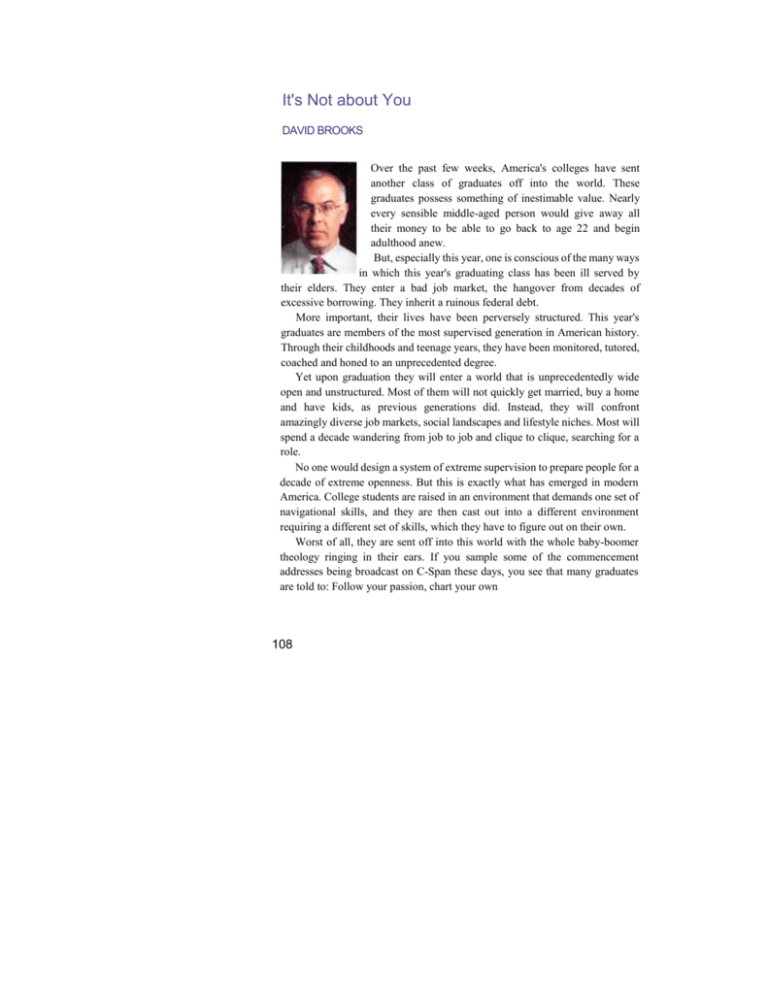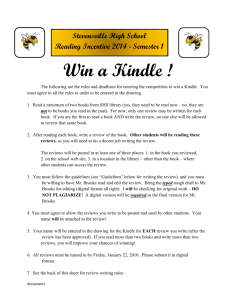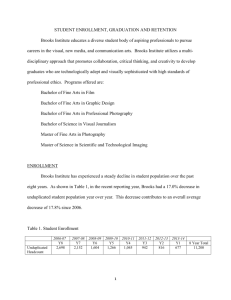it`s not about you david brooks and Understanding Brooks Binaries
advertisement

It's Not about You DAVID BROOKS Over the past few weeks, America's colleges have sent another class of graduates off into the world. These graduates possess something of inestimable value. Nearly every sensible middle-aged person would give away all their money to be able to go back to age 22 and begin adulthood anew. But, especially this year, one is conscious of the many ways in which this year's graduating class has been ill served by their elders. They enter a bad job market, the hangover from decades of excessive borrowing. They inherit a ruinous federal debt. More important, their lives have been perversely structured. This year's graduates are members of the most supervised generation in American history. Through their childhoods and teenage years, they have been monitored, tutored, coached and honed to an unprecedented degree. Yet upon graduation they will enter a world that is unprecedentedly wide open and unstructured. Most of them will not quickly get married, buy a home and have kids, as previous generations did. Instead, they will confront amazingly diverse job markets, social landscapes and lifestyle niches. Most will spend a decade wandering from job to job and clique to clique, searching for a role. No one would design a system of extreme supervision to prepare people for a decade of extreme openness. But this is exactly what has emerged in modern America. College students are raised in an environment that demands one set of navigational skills, and they are then cast out into a different environment requiring a different set of skills, which they have to figure out on their own. Worst of all, they are sent off into this world with the whole baby-boomer theology ringing in their ears. If you sample some of the commencement addresses being broadcast on C-Span these days, you see that many graduates are told to: Follow your passion, chart your own 108 CHAPTER 6 RHETORICAL ANALYSIS (109) course, march to the beat of your own drummer, follow your dreams and find yourself. This is the litany of expressive individualism, which is still the dominant note in American culture. But, of course, this mantra misleads on nearly every front. College grads are often sent out into the world amid rapturous talk of limitless possibilities. But this talk is of no help to the central business of adulthood, finding serious things to tie yourself down to. The successful young adult is beginning to make sacred commitments—to a spouse, a community and calling—yet mostly hears about freedom and autonomy. Today's graduates are also told to find their passion and then pursue their dreams. The implication is that they should find themselves first and then go off and live their quest. But, of course, very few people at age 22 or 24 can take an inward journey and come out having discovered a developed self. Most successful young people don't look inside and then plan a life. They look outside and find a problem, which summons their life. A relative suffers from Alzheimer's and a young woman feels called to help cure that disease. A young man works under a miserable boss and must develop management skills so his department can function. Another young woman finds herself confronted by an opportunity she never thought of in a job category she never imagined. This wasn't in her plans, but this is where she can make her contribution. Most people don't form a self and then lead a life. They are called by a problem, and the self is constructed gradually by their calling. The graduates are also told to pursue happiness and joy. But, of course, when you read a biography of someone you admire, it's rarely the things that made them happy that compel your admiration. It's the things they did to court unhappiness — the things they did that were arduous and miserable, which sometimes cost them friends and aroused hatred. It's excellence, not happiness, that we admire most. Finally, graduates are told to be independent-minded and to express their inner spirit. But, of course, doing your job well often means suppressing yourself. As Atul Gawande mentioned during his countercultural address last week at Harvard Medical School, being a good doctor often means being part of a team, following the rules of an institution, going down a regimented checklist. 110 READING AND UNDERSTANDING ARGUMENTS Today's grads enter a cultural climate that preaches the self as the center of a life. But, of course, as they age, they'll discover that the tasks of a life are at the center. Fulfillment is a byproduct of how people engage their tasks, and can't be pursued directly. Most of us are egotistical and most are self-concerned most of the time, but it's nonetheless true that life comes to a point only in those moments when the self dissolves into some task. The purpose in life is not to find yourself. It's to lose yourself. Understanding Brooks's Binaries RACHEL KOLB Connects article to personal experience to create an ethical appeal. Provides brief overview of Brooks's argument. States Brooks's central claim. Transition sentence. As a high school and college student, I was given an incredible range of educational and extracurricular options, from interdisciplinary studies to summer institutes to student-organized clubs. Although today's students have more opportunities to adapt their educations to their specific personal goals, as I did, David Brooks argues that the structure of the modern educational system nevertheless leaves young people ill-prepared to meet the challenges of the real world. In his New York Times editorial "It's Not about You," Brooks illustrates excessive supervision and uncontrolled individualistic rhetoric as opposing problems that complicate young people's entry into adult life, which then becomes less of a natural progression than an outright paradigm shift. Brooks's argument itself mimics the pattern of moving from "perversely structured" youth to "unprece-dentedly wide open" adulthood: it operates on the basis of binary oppositions, raising familiar notions about how to live one's life and then dismantling them. Throughout the piece, it relies less on factual evidence than on Brooks's own authoritative tone and skill in using rhetorical devices. In his editorial, Brooks objects to mainstream cultural messages that sell students on individuality, but bases his conclusions more on general observations than on specific facts. His argument is, in itself, a loose form of rhetorical analysis. It opens by telling us to "sample some of the commencement addresses being broadcast on C-Span these days," where we will find messages such as: "Follow your passion, chart your own course, march to the beat of your own drummer, follow your dreams and find yourself." As though moving down a checklist, it then scrutinizes the problems with this rhetoric of "expressive individualism." Finally, it turns to Atul Gawande's "countercultural address" about working collectively, en route to confronting the 111 112 READING AND UNDERSTANDING ARGUMENTS individualism of modern America. C-Span and Harvard Medical School aside, however, Brooks's argument is aston ishingly short on external sources. He cites no basis for Comments claims such as "this year's graduates are members of the critically on most supervised generation in American history" or "most author's use of successful young people don't look inside and then plan a life," despite the fact that these claims are fundamental to his observations. Instead, his argument persuades through painting a picture—first of "limitless possibilities," then of young men and women called into action by problems that "summon their life"—and hoping that we will find the illustration familiar. Instead of relying on the logos of his argument, Brooks assumes that his position as a baby boomer and New York Times columnist will provide a sufficient enough ethos to validate his claims. If this impression of age and social status did not enter our minds along with his bespecta cled portrait, Brooks reminds us of it. Although he refers . to the theology of the baby boomer generation as the author's "worst of all," from the beginning of his editorial he allots himself as another "sensible middle-aged person" and distances himself from college graduates by referring to them as "they" or as "today's grads," contrasting with his more inclusive reader-directed "you." Combined with his repeated use of passive sentence constructions that create a confusing sense of responsibility ("The graduates are sent off into the world"; "the graduates are told"), this sense of distance could be alienating to the younger audiences for which this editorial seems intended. Granted, Brooks compensates for it by embracing themes of "excellence" and "fulfillment" and by opening up his message to "most of us" in his final paragraph, but nevertheless his self-defined persona has its limitations. Besides dividing his audience, Brooks risks reminding us that, just as his observations belong only to this persona, his arguments apply only to a subset of American society. More specifically, they apply only to the well-educated middle to upper class who might be more likely to fret after the implications of "supervision" and "possibilities," or the CHA P T E R 6 RHETORICAL ANALYSIS readers who would be most likely to flip through the New York 'Times. Brooks overcomes his limitations in logos and ethos through his piece's greatest strength: its style. He effectively frames cultural messages in binaries in order to reinforce the disconnect that exists between what students are told and what they will face as full members of society. Throughout his piece, he states one assumption after another, then prompts us to consider its opposite. "Serious things" immediately take the place of "rapturous talk"; "look|ingj inside" replaces "look[ing| outside"; "suppressing yourself" becomes an alternative to being "independent-minded." Brooks's argument is consumed with dichotomies, culminating with his statement "It's excellence, not happiness, that we admire most." He frames his ideas within a tight framework of repetition and parallel structure, creating muscular prose intended to engage his readers. His repeated use of the phrase "but, of course" serves as a metronomic reminder, at once echoing his earlier assertions and refening back to his air of authority. Brooks illustrates the power of words in swaying an audience, and in his final paragraph his argument shifts beyond commentaiy. Having tested our way of thinking, he now challenges us to change. His editorial closes with one final binary, the claim that "The purpose in life is not to find yourself but "to lose yourself." And, although some of Brooks's previous binaries have clanged with oversimplification, this one rings truer. In accordance with his adoption of the general "you," his concluding message need not apply only to college graduates. By unfettering its restrictions at its climax, Brooks liberates his argument. After all, only we readers bear the responsibility of reflecting, of justifying, and ultimately of determining how to live our lives. WORK CITED Brooks, David. "It's Not about You." Everything's an Argument. Ed. Andrea A. Lunsford and John J. Ruszkiewicz. 6th ed. Boston: Bedford, 2013,108-10. Print. Rpt. of "It's Not about You." New York Times 30 May 2011. 113 Closely analyzes Brooks's style. Analyzes author's conclusion.






